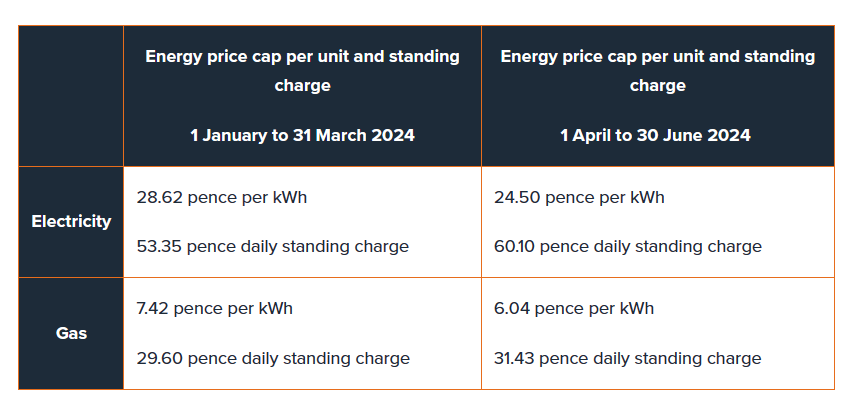You don’t need to cast your minds back all that far to remember how expensive electricity became in the UK. Heck, the situation became so dire that the Government had to step in by introducing an Energy Price Guarantee (EPG) between October 1, 2022 and June 30, 2023, effectively capping how much you would pay per kilowatt. On top of that, underscoring the gravity of the problem, the Government further introduced a non-repayable £400 discount known as the Energy Bills Support Scheme (EBSS).
Now, though, the situation is stable enough for energy companies to fight over customer retention. Competition has returned to the market. In this article, I explain what that means to you and how much you can save for your everyday appliances and PCs.
| Date | Ofgem Cap for TDCV | EPG | EBSS |
|---|---|---|---|
| January 2022 | £1,277 | NA | NA |
| April 2022 | £1,971 | NA | NA |
| October 2022 | £3,529 | £2,500 | £200 |
| January 2023 | £4,279 | £2,500 | £200 |
| April 2023 | £3,280 | £2,500 | NA |
| July 2023 | £2,074 | NA | NA |
| October 2023 | £1,834 | NA | NA |
| January 2024 | £1,928 | NA | NA |
| April 2024 | £1,690 | NA | NA |
For some context, displayed above is the Ofgem cap, EPG, and EBSS from the last two years. Based on average usage determined by something known as Typical Domestic Consumption Values (TDCV), you can see that most users not on a fixed tariff would have paid far more if the Government hadn’t stepped in. The cause? Wild spikes in the cost of electricity and gas largely emanated from the ongoing conflict in the Ukraine.
Things can only get better?
Based on the TDCV, the worst time was during April 2023 through July 2023, where fixed deals were scarce, and most users were on the default Ofgem-instigated price cap. Fast forwarding to today paints an altogether rosier picture that shows the typical dual-fuel bill has fallen by almost one third. What’s more, there are now numerous fixed-tariff deals that undercut the price cap.

Breaking down the latest cap into numbers more easily digestible, the £1,690 typical figure translates to electricity costing a maximum 24.5p per day whilst gas falls to 6.04p. Never one to miss a trick, the standing charges, which everyone has to pay, increase by an appreciable degree. Put simply, you’re paying around a pound a day for the privilege of having mains-connected gas and electricity.
Though these figures are far better than those presented in recent history, users with smart meters willing to take a calculated punt can jump on to tracker tariffs that, as the name suggests, take into account wholesale prices which have plummeted recently. In fact, I took advantage of this scenario by switching over to an Octopus Tracker (December 2023 v1) on February 19 this year.
The good news is the per-kilowatt cost of electricity and gas is substantially lower than even the latest Ofgem cap, which is music to my ears. Looking at the last 30 days, I’ve averaged around 17p per kWh for electricity and, wait for it, 3.8p per kWr for gas, along with lower standing charges. Hooray for me!
Of course, there is no absolutely free lunch. The Octopus Tracker tariff is actually a year-long deal, which means that whilst your daily unit rates will change, the formula and the standing charges are set for the duration of your term. What’s more, should prices spike again, I am not protected by the Ofgem cap. Rather, if the excrement hits the fan, I’m subject to a maximum charge of 100p per kWr for electricity and 30p per kWh for gas. Ouch! You pays your money and makes your choice.
OK, how does this benefit me, the tech enthusiast?
I’m glad you asked. In the midst of escalating electricity prices merely a year ago, I must admit that I thought about the cost of gaming on my PC or PlayStation 5. Heck, I even dabbled with the notion of turning off the fridge in the garage – every little helps, right? Now, on the Octopus Tracker, I’m even thinking about investing in an electric car – some days, the daily charge drops to around 10p per kWr, or merely £8 for 250+ miles of range.
Doing the number crunching for you, the following table shows the cost of various home appliances based on a high-usage consumption set to six hours a day, six days a week. The April 2023 figure is calculated using an EPG of £2,500 translating to around 33.6p per kWh. April 2024’s Ofgem cap drops this to 25.7p per kWh, while the Octopus Tracker tariff (OTT) represent the per-kilowatt costs of 17.8p. All figures include domestic VAT at 5%. Standing charges are ignored.
| Watts | Apr 23 | Apr 24 | OTT | |
|---|---|---|---|---|
| PlayStation 5 | 198W | £124.50 | £95.26 | £65.97 |
| Microsoft Xbox Series S | 85W | £53.47 | £40.89 | £28.32 |
| LG 65C2 OLED TV | 162W | £101.90 | £77.94 | £53.98 |
| Club386 Test PC (idle) | 85W | £53.47 | £40.89 | £28.32 |
| Club386 Test PC (2D load) | 230W | £144.67 | £110.65 | £76.64 |
| Club386 Test PC (gaming) | 385W | £242.17 | £185.22 | £128.29 |
| Philips 43in UHD PC monitor | 95W | £59.76 | £45.70 | £31.66 |
| Samsung fridge freezer* | 32W | £94.19 | £72.04 | £49.90 |
| Hotpoint chest freezer* | 35W | £103.18 | £78.80 | £54.57 |
| Tumble dryer** | 2,800W | £97.84 | £74.84 | £51.84 |
| Electric shower** | 9,000W | £314.50 | £240.55 | £166.61 |
| Electric car charging*** | 73,000W | £1,275.04 | £975.57 | £675.69 |
** based on two hours per week
*** based on one charge every week
Analysis
Compared to just a year ago – remember, there was an EPG in place for most – the numbers are illuminating for a heavy-usage household. Nevertheless, it now costs about half as much to power the same electrical devices when using the Tracker tariff versus the EPG price. Assuming you have an electric car in which you do around 12,000 miles a year and charge at home, the total cost of 10 listed appliances – the Club386 system is taken as 2D load – tots up to almost £2,400 from last year, dropping to around £1,800 for April 2024’s Ofgem cap, and down to around £1,250 on my current tracker deal.
Being even handed, your differences are likely to be less. I imagine most won’t have an electric car, but the sentiment is the same. For gamers out there, saving £30 or £70 on yearly electricity costs paves the way in getting a triple-A game for effectively free. Put simply, as electricity is a cost you incur on an ongoing basis, why pay more than you absolutely have to.
Knowing that deals are out there right now, it’s incumbent upon you to search out the best ones, because savings are real. Appreciating I’m on a good one, time to fire up the PS5 and LG OLED for some Final Fantasy VII Rebirth fun.
